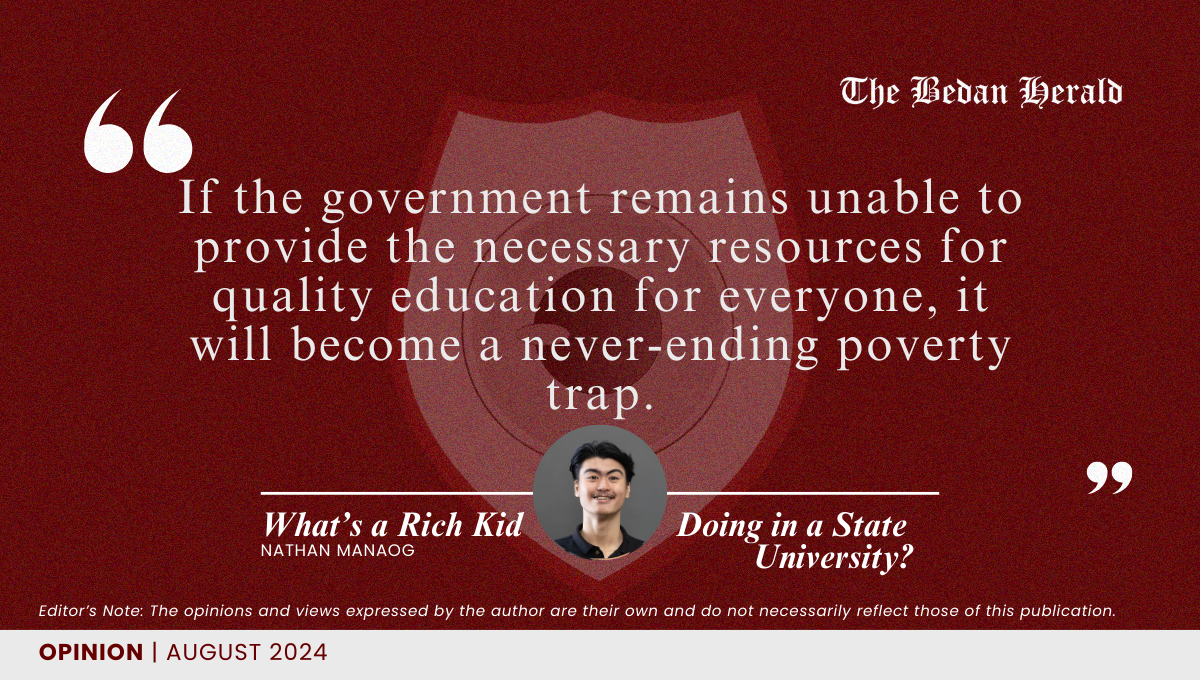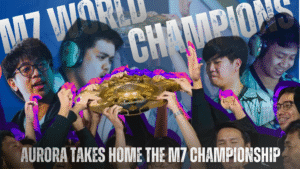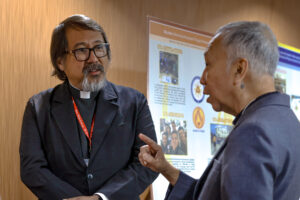By Nathan Manaog | August 14, 2024
What’s a Rich Kid Doing in a State University?
ALL men are created equal, but when it comes to attaining quality education in state universities, it is no equalizer.
Recently, there have been posts on social media, and an abundance of debates and discussions have been spanning whether students who are well off in life deserve to be in state universities like the University of The Philippines (UP). “Wag na kayong, makipagsiksikan dito, ibigay nyo ang mga state university para sa mahihirap lang!” or “Ah, nakapasok lang yan dahil sa laki ng bulsa,” might be a common phrase to come by when talking about the privileged getting admitted to a state university. Should they be labeled as someone who got their spot unfairly because of their economic status?
Under the Universal Access to Quality Tertiary Education Act (Republic Act. No. 10931), signed by former President Rodrigo Duterte in 2017, it grants free tuition in state universities as long as they meet the requirements. UP has adopted a combination of the admission test (also known as the UPCAT), which makes up 60%, and the standardized weighted average of high school grades, which makes up 40% of qualification.
For me, this is where the real problem starts. I came across an article from a faculty publication under the UP School of Economics in which they dissect college admissions. They found that 56-66% of the applicants granted a scholarship came from the top three income classifications, while only 17-23% of the admitted applicants came from the bottom income classification. It is noteworthy that “socioeconomic” and geographic considerations are factored in choosing campus qualifiers. Not to mention, in 2017, the year that R.A 10931 was signed, 99% of admissions to UP came from private schools.
The truth is that not everyone is born with the same starting point. Many people have to work harder than others to get where they want to be. I don’t think it's wrong for someone who is rich to be in a state university. These people should not be discriminated against. To answer the question, what’s a rich kid doing in a state university? As long as they’ve done things legally and passed all the requirements, these people are simply just living their dream to get the best quality education they can. If they worked hard for it, they deserve it. It is their freedom; it is their right. The fair admission process must be done by everyone, regardless of economic status. There should be no special treatment.
However, there is a more alarming point that should be taken action upon immediately. The situation at hand shows that there is still a deep-rooted problem in society, especially when it comes to education and poverty. It is obvious that there is a huge gap between the richest and poorest Filipinos. Yes, I’ve mentioned that it isn’t wrong to come from a well-off family and be a scholar of the Philippines. But we can’t deny the fact that quality education is still bought in this country. The rich clearly have an advantage when it comes to getting a spot in state universities. They’ve had quality education from private schools, can afford tutors and review centers, and can pay for their basic needs when attending school, like transportation and food. This is mainly a systemic problem that crosses various factors. One of the things that makes it harder for the poor to get into state universities is the weak education system. The government should be responsible for providing this from start to finish since past grades and test scores may be included when qualified.
If the government remains unable to provide the necessary resources for quality education for everyone, it will become a never-ending poverty trap. The impoverished will stay the same, and they won’t have the resources and opportunities to get out of poverty.
Volume 30 | Issue 1




